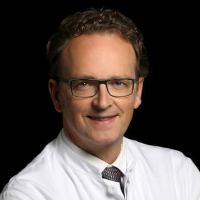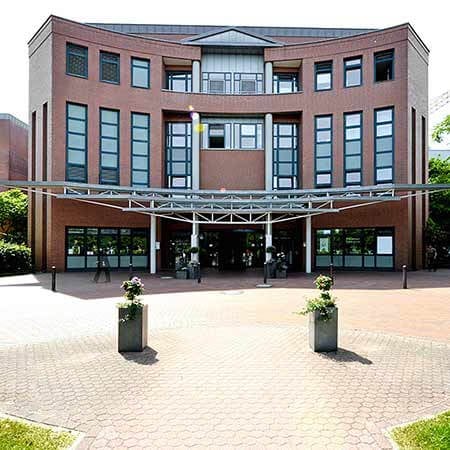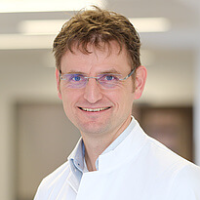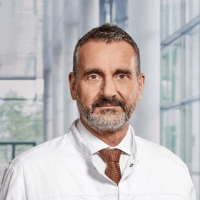Pulmonary Valve Replacement abroad
Treatment prices are regulated by national law of the corresponding countries, but can also include additional hospital coefficients. In order to receive the individual cost calculation, please send us the request and medical records.

Department of Cardiothoracic Surgery
According to the Focus magazine, the Department of Cardiothoracic Surgery ranks among the top German medical facilities specializing in the surgical treatment of diseases of the cardiovascular system and lung cancer! The department offers the full range of surgical services for the treatment of diseases of the cardiovascular system, respiratory tract, including heart and lung transplantation, artificial heart implantation. The therapeutic options include aortic surgery, coronary artery bypass grafting, transplantation surgery, surgical treatment of heart rhythm disorders (arrhythmias), minimally invasive surgery, surgical treatment of the heart valves, including reconstructive interventions. All operations are performed using state-of-the-art technology and in accordance with the current recommendations of professional societies.






Department of Cardiac Surgery
The Department of Cardiac Surgery provides a full range of surgical treatment in its area of specialization. Special emphasis is placed on heart valve repair and replacement surgery, coronary artery bypass grafting, thoracic aortic surgery, adult congenital and acquired heart disease surgery, pacemaker and defibrillator implantation, and artificial heart implantation for severe heart failure. Many heart operations are performed using minimally invasive techniques, which has a positive effect on the healing of the surgical wound. Minimally invasive cardiac procedures also reduce surgical risks and contribute to a rapid recovery of the patient in the postoperative period. Surgical treatment of cardiac pathologies is performed in advanced operating rooms equipped with the latest technology. The cardiac surgeons of the department successfully perform routine and complex surgical procedures, saving the lives of thousands of patients. The specialists work in accordance with current clinical protocols and follow the recommendations of the German Society for Thoracic and Cardiovascular Surgery (DGTHG).


Department of Cardiothoracic Surgery and Vascular Surgery
The Department of Cardiothoracic Surgery and Vascular Surgery provides effective surgical treatment for diseases of the heart, respiratory system, and blood vessels. The team of cardiac surgeons operates on patients with heart valve pathologies, coronary heart disease, heart failure, and heart rhythm disturbances. In the field of thoracic surgery, the key focus is on the surgical removal of lung tumors and lung metastases. The specialists in this area also perform surgery to repair chest wall deformities. In the field of vascular surgery, interventions for abdominal and thoracic aortic aneurysms are most often performed here. The department's vascular surgeons are also exceptionally competent in the treatment of peripheral occlusive arterial disease. A great advantage for the department's patients is that almost all surgical interventions are performed using minimally invasive techniques, so there is no need for a long postoperative recovery. The department's operating rooms are equipped with state-of-the-art technology. This allows for effective and safe treatment. The priority is always personalized medical care for patients.






Pulmonary valve regurgitation is a rare heart disease, usually acquired, and it develops mainly at a young age. This condition can be a consequence of heart surgery to treat tetralogy of Fallot and also develops due to pulmonary hypertension, rheumatic diseases, infective endocarditis, and heart tumors. The main treatment method for this disease is heart valve replacement surgery. Surgeons abroad perform it not only with the help of open heart surgical techniques, but in some cases, it can be performed using an endovascular technique through the blood vessels. You are welcome to use the Booking Health service to find the cost of treatment abroad and make your appointment at a specialized hospital.
Content
- What is pulmonary valve regurgitation?
- Treatment principles
- Heart valve replacement
- Minimally invasive artificial heart valve implantation
- Where to undergo treatment?
What is pulmonary valve regurgitation?
The pulmonary valve is located in the pulmonary artery. It receives venous blood from the right ventricle, and then it goes to the lungs to give off carbon dioxide and be saturated with oxygen.
Normally, the valve should allow blood to pass only in one direction, namely towards the lungs. The release of blood occurs during cardiac muscle contraction. Then comes the period of relaxation of the heart. In this phase, the heart valve closes and does not allow blood to flow in the opposite direction, preventing it from returning back to the right ventricle.
Pulmonary valve regurgitation is a condition in which the heart valve cannot close the pulmonary artery completely. As a result, during the period of relaxation of the heart , part of the blood returns back to the right ventricle, overloading it with volume.
Pulmonary valve regurgitation was graded as:
- grade 1 occurs when up to 25% of the blood returns back;
- grade 2 occurs when up to 50% of the blood returns back;
- grade 3 occurs when more than 50% of the blood returns back;
Pulmonary valve regurgitation can be absolute or relative. An absolute form of heart disease means that the valve itself is damaged. Relative regurgitation is more common. In this case, the heart valve does not have any pathological changes, but the lumen of the pulmonary artery increases, so it does not close completely. The most common cause of relative pulmonary valve regurgitation is pulmonary hypertension (elevated pressure in the pulmonary artery due to increased pulmonary vascular resistance).
Treatment principles
In the case of pulmonary valve regurgitation, doctors usually do not repair the valve. The main treatment method is heart valve replacement. In most patients, it is performed using open surgery, that is, through an incision in the chest. Some patients may have a minimally invasive implantation of an artificial heart valve through the blood vessels.
Pulmonary valve regurgitation does not always require medical attention. It is not as severe as other valvular regurgitation, but over time it can lead to changes in the heart. When a disease is detected, patients are monitored. Operations can be performed in the following cases:
- pulmonary valve regurgitation of grade 2-3;
- the onset of symptoms, such as shortness of breath;
- even if clinical manifestations only appear during exercise tests, a patient may be offered surgery.
- right-sided ventricular heart failure;
- dilatation of the right ventricle.
Heart valve replacement
Pulmonary valve replacement involves the implantation of an artificial valve. They are mechanical and biological. Mechanical valves are not placed in the position of the pulmonary artery because blood flow is relatively slow here, and blood clots often occur even if a patient is constantly taking anticoagulants.
During the operation, only biological valves are implanted. They have a shorter service life since, unlike mechanical ones, they gradually degrade (wear out). This is the main problem in the treatment of pulmonary valve regurgitation because most patients are young people, as well as children who have undergone surgical repair of tetralogy of Fallot.
In developed countries, the problem of repeated operations is partially solved. Repeated heart valve replacement can be performed using minimally invasive techniques, namely without opening the chest but through an incision in the leg.
The worst survival of biological prostheses is noted in children:
- the 5-year survival rate reaches 80%;
- the 10-year survival rate is 60%.
The problem is not only the degradation of the valve but also the dilation of the diameter of the pulmonary artery as the child grows. As a result, the prosthesis is untenable, and doctors have to implant a new one.
In adults, heart valve prosthesis survival rates are better. They usually serve 15 to 30 years. But in any case, a second operation will be required sooner or later. Perhaps it will not be the only one in the patient's life.
Healthcare professionals at some specialized centers already perform operations to implant the latest types of heart valves that are made of biodegradable materials. They are gradually destroyed and replaced by the patient's own tissues after their implantation. As a result, a child receives a native heart valve that grows with them and will not require any heart valve replacement surgery in the future. But these are new types of artificial heart valves that have been developed recently and are currently only used in clinical trials. It remains to be seen what long-term results will be obtained after their implantation, as research continues.
Minimally invasive artificial heart valve implantation
In some cases, an artificial pulmonary valve can be implanted using minimally invasive techniques through an incision in the leg.
Such operations are often performed for repeated pulmonary valve replacement surgery. A new artificial valve is placed inside a biological prosthesis that has lost its function due to degenerative processes. An endovascular intervention is performed from the inside of the blood vessels under X-ray guidance. It is not necessary to recover for a long time after such operations, and the risk of complications is much lower.
Minimally invasive implantation of an artificial pulmonary valve is less commonly done in patients with newly diagnosed regurgitation. Approximately 20% of children after the repair of tetralogy of Fallot are considered candidates for such an operation. A condition for minimally invasive heart valve replacement is the small size of the valve ring. In addition, new types of prostheses have been developed that can be placed even in a large diameter valve ring, but so far they are used only in clinical trials.
Here are some benefits of implanting an artificial heart valve through the blood vessels compared to open heart surgery:
- minimal trauma rate;
- no connection to a heart-lung machine is required;
- minimal blood loss;
- quick recovery after surgery;
- low risk of complications;
- smooth course of the postoperative period;
- short hospital stay.
Where to undergo treatment?
If you are diagnosed with problems with your heart valves, you can seek medical attention from one of Heart Surgery Centers abroad. Tremendous progress has been made in the treatment of heart disease in developed countries. Heart defects can be successfully repaired at any age.
There are a few reasons for you to undergo your treatment abroad. These are as follows:
- safe and efficient operations at the Centers of Excellence;
- you will be operated on by the best surgeons in the world;
- the latest types of artificial heart valves with a long service life are implanted, providing the best hemodynamic parameters;
- several heart defects can be repaired simultaneously during a single surgery;
- minimally invasive techniques from within the blood vessels can sometimes be used to replace a pulmonary valve;
- patients receive adequate symptomatic therapy and quality care after surgery, and then they can undergo cardiac rehabilitation.
On the Booking Health website, you can find the cost of treatment abroad and choose the most suitable medical care program. Our specialists will help you to find a hospital that specializes in the treatment of valvular diseases, uses innovation, and achieves the best results. When making your treatment appointment at a hospital through the Booking Health website, the cost of treatment will be lower due to the absence of additional fees for foreign patients. You will also get insurance that will cover all medical expenses not provided for by the original medical care program. The Booking Health staff will fully organize your trip, and you can focus on restoring your health.
Authors:
The article was edited by medical experts, board-certified doctors Dr. Nadezhda Ivanisova and Dr. Vadim Zhiliuk. For the treatment of the conditions referred to in the article, you must consult a doctor; the information in the article is not intended for self-medication!
Sources:

